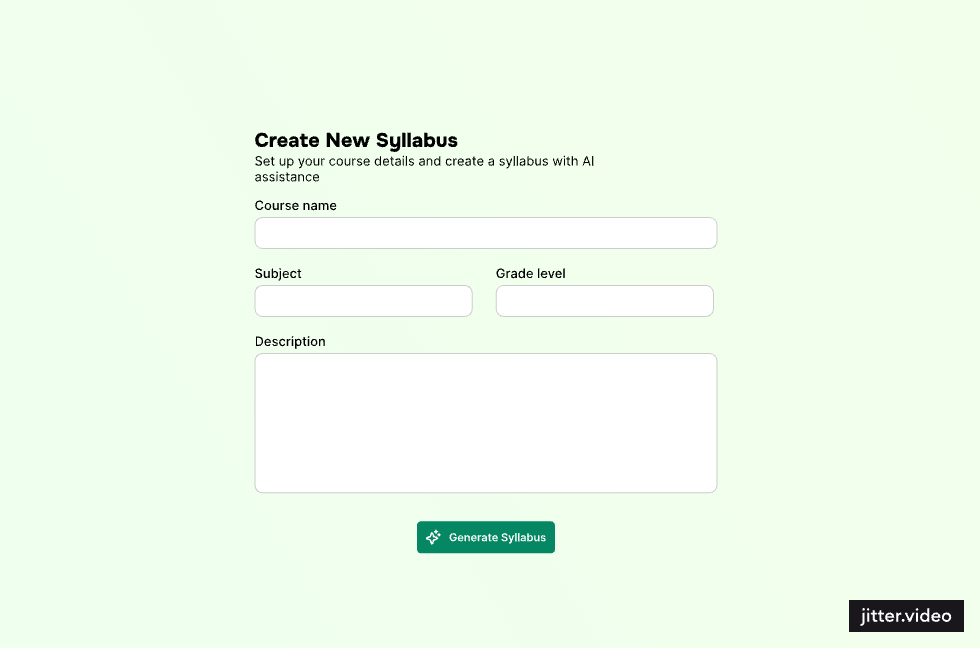Automate your grading with AI, delivering fast, fair, and accurate feedback. Reclaim hours for what matters most: your students
Submitted on {[date=today date]}
Climate change is one of the most pressing issues of our time. The Earth’s climate has changed throughout history. Just in the last 650,000 years, there have been seven cycles of glacial advance and retreat, with the abrupt end of the last ice age about 11,700 years ago marking the beginning of the modern climate era — and of human civilization. Most of these climate changes are attributed to very small variations in Earth’s orbit that change theamount of solar energy our planet receives. The current warming trend is of particular significance because most of it is extremely likely (greater than 95% probability) to be the result of human activity since the mid-20th century and proceeding at a rate that is unprecedented over decades to millennia.
Earth-orbiting satellites and other technological advances have enabled scientists to see the big picture, collecting many different types of information about our planet and its climate on a global scale. This body of data, collected over many years, reveals the signals of a changing climate.
The heat-trapping nature of carbon dioxide and other gases was demonstrated in the mid-19th century. Their ability to affect the transfer of infrared energy through the atmosphere is the scientific basis of many instruments flown by NASA. There is no question that increased levels of greenhouse gases must cause the Earth to warm in response.
Climate change is one of the most pressing issues of our time. The Earth’s climate has changed throughout history. Just in the last 650,000 years, there have been seven cycles of glacial advance and retreat, with the abrupt end of the last ice age about 11,700 years ago marking the beginning of the modern climate era — and of human civilization. Most of these climate changes are attributed to very small variations in Earth’s orbit that change theamount of solar energy our planet receives. The current warming trend is of particular significance because most of it is extremely likely (greater than 95% probability) to be the result of human activity since the mid-20th century and proceeding at a rate that is unprecedented over decades to millennia.
Earth-orbiting satellites and other technological advances have enabled scientists to see the big picture, collecting many different types of information about our planet and its climate on a global scale. This body of data, collected over many years, reveals the signals of a changing climate.
The heat-trapping nature of carbon dioxide and other gases was…..
Submitted on {[date=today date]}






Upload your assignments, apply your rubric in seconds, and get consistent, unbiased results—without the hours of grading.
GradeGenie analyzes student writing for key criteria, suggests fair scores, and crafts actionable feedback—all aligned to your rubric. Review, tweak, and approve in minutes, not hours. Keep the human touch while letting AI handle the heavy lifting.

GradeGenie’s inline comments suggest targeted, curriculum-aligned insights, so you can personalize feedback without the extra hours. Edit and approve with a tap, ensuring students get meaningful guidance while you save time. Teach more, type less.


GradeGenie analyzes student writing for key criteria, suggests fair scores, and crafts actionable feedback—all aligned to your rubric. Review, tweak, and approve in minutes, not hours. Keep the human touch while letting AI handle the heavy lifting.

GradeGenie’s AI crafts a structured, curriculum-aligned syllabus tailored to your course—complete with policies, schedules, and learning goals. Customize with ease and start your semester ready, with more time to focus on what matters: your students

Grade essays 10x faster with AI suggestions while keeping your final say.
Reclaim hours each week to spend on lesson planning and students.
Apply rubrics uniformly across all submissions for objective scoring
Find instant solutions to frequently asked questions about GradeGenie. Whether you’re exploring pricing, troubleshooting, or just getting started, we’ve got you covered.
GradeGenie is your AI-powered grading assistant, designed to save you hours on repetitive tasks. From bulk grading to personalized feedback, we streamline your workflow—so you can focus on teaching, not tedious admin.
Our plagiarism checker is built for precision and trust. It scans billions of sources and provides verifiable results, helping you uphold academic integrity with confidence—without adding to your workload.
Absolutely. GradeGenie automates time-consuming steps like rubric application and feedback generation. Most educators save hours each week, freeing them to mentor students and enhance learning.
Not at all. You stay in control. GradeGenie offers smart suggestions, but the final call is always yours. Think of it as your reliable assistant—never a replacement.
What happens when I sign up for a paid plan?By making grading faster and more consistent, GradeGenie enables timely, targeted feedback—giving students clearer insights and better opportunities to grow.
When you sign up for a paid plan, you get immediate access to all features, including the 100x grader, instant rubric generator, syllabus creator, all-in-one assignment manager, and more. You are billed monthly to continue using these features, and you can cancel the next billing by emailing us before the billing date.
“I seriously don’t know how I managed without GradeGenie. I just finished grading 52 personal narratives and built the rubric I used with it. What would have taken me 2 weekends was done before dinner. The feedback it generates is also way more actionable than anything I could type out for every student.”

IB English Teacher at Singapore International School
“I don’t usually trust AI for something as personal as feedback, but GradeGenie gets it right. I can still edit anything before students see it, but honestly, 90% of the time, it’s spot-on with what I would have written. My students are revising faster and better.”

Lecturer at Grand Canyon University
“We just finished our first round of essay moderation, and for the first time, nobody argued over marks. GradeGenie made it so easy to apply the same rubric across all classes and pull consistent, detailed feedback. It’s saving relationships, not just time.”

IB Teacher at American International School
“The syllabus builder is my favorite part. I had to submit an updated semester plan for approval last week – usually a 5-hour task. GradeGenie helped me knock it out in 15 minutes, with standards and pacing already built in. It even suggested pacing ideas based on my assignments. Total game-changer for planning.”

Teacher at Kawartha Pine Ridge District School Board
“GradeGenie has completely changed how we work. Building rubrics, grading essays, writing feedback, and even creating lesson plans – it’s all in 1 place. Our moderation is faster, planning is easier, and students are getting better feedback without me having to spend nights and weekends catching up.”

Teacher at Troy Schools
“GradeGenie made me feel like a better teacher. I’m teaching AP Lang to 112 students this year, and grading essays used to eat me alive. GradeGenie lets me grade by rubric, send real feedback, and still make it home before dark. Plus, it catches strengths and areas for growth I might’ve missed when I’m tired.”

Teacher at Cathedral Catholic School
Automate your grading with AI, delivering fast, fair, and accurate feedback. Reclaim hours for what matters most: your students
Submitted on {[date=today date]}
Climate change is one of the most pressing issues of our time. The Earth’s climate has changed throughout history. Just in the last 650,000 years, there have been seven cycles of glacial advance and retreat, with the abrupt end of the last ice age about 11,700 years ago marking the beginning of the modern climate era — and of human civilization. Most of these climate changes are attributed to very small variations in Earth’s orbit that change theamount of solar energy our planet receives. The current warming trend is of particular significance because most of it is extremely likely (greater than 95% probability) to be the result of human activity since the mid-20th century and proceeding at a rate that is unprecedented over decades to millennia.
Earth-orbiting satellites and other technological advances have enabled scientists to see the big picture, collecting many different types of information about our planet and its climate on a global scale. This body of data, collected over many years, reveals the signals of a changing climate.
The heat-trapping nature of carbon dioxide and other gases was demonstrated in the mid-19th century. Their ability to affect the transfer of infrared energy through the atmosphere is the scientific basis of many instruments flown by NASA. There is no question that increased levels of greenhouse gases must cause the Earth to warm in response.
Climate change is one of the most pressing issues of our time. The Earth’s climate has changed throughout history. Just in the last 650,000 years, there have been seven cycles of glacial advance and retreat, with the abrupt end of the last ice age about 11,700 years ago marking the beginning of the modern climate era — and of human civilization. Most of these climate changes are attributed to very small variations in Earth’s orbit that change theamount of solar energy our planet receives. The current warming trend is of particular significance because most of it is extremely likely (greater than 95% probability) to be the result of human activity since the mid-20th century and proceeding at a rate that is unprecedented over decades to millennia.
Earth-orbiting satellites and other technological advances have enabled scientists to see the big picture, collecting many different types of information about our planet and its climate on a global scale. This body of data, collected over many years, reveals the signals of a changing climate.
The heat-trapping nature of carbon dioxide and other gases was…..
Submitted on {[date=today date]}